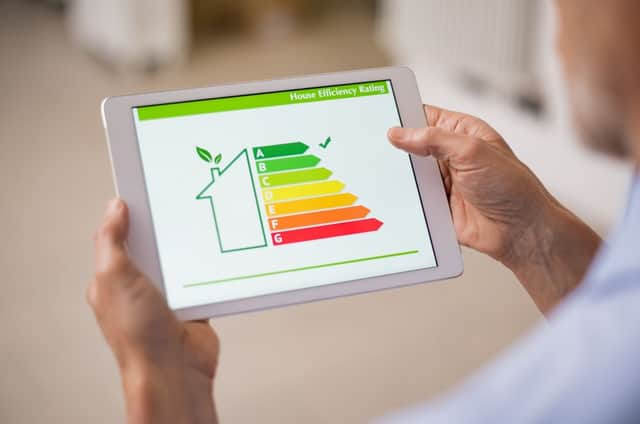Homeowners could receive cash reward up to £2,000 for making energy-efficient improvements on their properties


A High Street bank is offering homeowners a cash reward of up to £2,000 to make energy-efficient improvements to their properties.
Barclays has announced the pilot of its Greener Home Reward to help those who want to make energy-saving or environmentally friendly changes to their home, but the cost is holding them back.
Advertisement
Hide AdAdvertisement
Hide AdIt will offer up to £2,000 to Barclays residential mortgage customers who register for the cash reward online and then make and pay for a selected home energy efficiency-related improvement.
Customers can choose to install any one of several home improvements, including an air-source heat pump, double or triple-glazed windows, solar panels, or home insulation, as long as the improvement is completed by a TrustMark-registered business or tradesperson.
It comes after research found three quarters of homeowners cannot afford to make energy-efficient home improvements.
The poll of 2,000 property owners found that homeowners are financially constrained when it comes to making their homes more energy-efficient, despite 86 per cent being worried about climate change.
Advertisement
Hide AdAdvertisement
Hide AdHowever, 75 per cent still want to do improve the energy efficiency of their home at some point in the future.
C.S. Venkatakrishnan, group chief executive officer at Barclays, said: “There is a clear need to improve the energy efficiency of UK housing, but as our data indicates, cost remains a barrier to turning desire into action.
“We hope this pilot will go some way towards encouraging consumers to make energy efficiency-related home improvements.”
The bank also worked with property expert and presenter Martel Maxwell, who said: “Almost every homeowner I meet wants to be greener, but so often cost is holding them back.
Advertisement
Hide AdAdvertisement
Hide Ad“They continue to make smaller changes for years, but in their heads and hearts want to make a big difference.
“I know what it’s like to take that leap; when we built our home six years ago, we went ‘renewable’ installing everything from solar panels to a ground source heat pump, triple glazing and lots in between, which was a big undertaking.”
The study found a lack of knowledge is also a barrier to completing home improvement works, with 31 per cent unsure what changes would be most impactful on their energy bills.
Only a quarter (26 per cent) are aware of the benefits of insulating external doors, while a high proportion has never heard of a biomass boiler (69 per cent) or solar battery storage (63 per cent).
Advertisement
Hide AdAdvertisement
Hide AdWhile 19 per cent haven’t conducted the necessary levels of research into a preferred course of action, to justify making any changes.
Instead, when asked about the measures they are taking, the vast majority fall under the banner of lifestyle choices.
These include avoiding or minimising food waste (73 per cent), seeking to reduce use of central heating (62 per cent) and turning off electrical appliances rather than leaving them on standby (56 per cent).
Behavioural economist Dr Pete Brooks said: “When weighing up the costs and benefits of retrofitting, a behavioural bias called ‘hyperbolic discounting’ often comes into play, which in essence means that we tend to prefer smaller, immediate rewards over larger payoffs further down the line.
Advertisement
Hide AdAdvertisement
Hide Ad“With the expected payback period for some home improvements clocking in at over a decade, these larger options may be overlooked.
"Even if the long-term benefits might be greater, the end result is often inaction.”
The knowledge gap is not just restricted to specific energy enhancements as a third of homeowners don’t know what an Energy Performance Certificate (EPC) is, while 51 per cent are unaware of their own home’s EPC rating.
Martel Maxwell’s tips for homeowners looking to retrofit their home:
Windows
Think about upgrading. For bigger budgets this can mean going from single-glazed to double or upgrading your old double-glazing to triple-glazed. In listed buildings or those in conservation areas this is often not allowed, so consider secondary glazing; this effectively adds a pane of glass inside, so original windows remain as they are.
Advertisement
Hide AdAdvertisement
Hide AdIf you have a smaller budget, making sure everything is airtight so drafts can’t get into your home is crucial. You can do this by fixing any glass, re-sealing frames or replacing rotten timber. Heavy-duty curtains that keep in heat can have a big impact, as can draft excluders by doors.